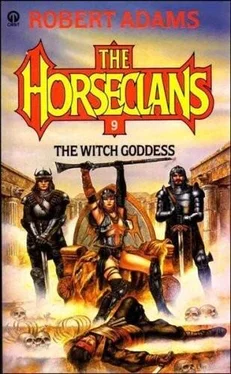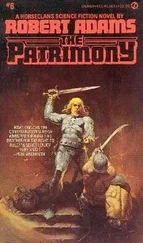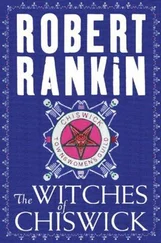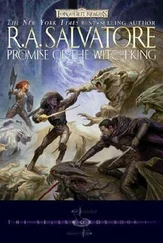“For all that we’ve taken a few casualties this last week, Lord Steev, none were killed or hurt so badly that Elmuh’s wondrous skills could not quickly put them aright. I must say, here, that I like this mode of campaigning far better than that of which our lord, the prince, spoke. It sits better in my craw to fight armed, mounted men, rather than to raid and brutalize and burn out the farms and steadings of families.”
“Yet, Duke Bili,” the oldster gently pointed out, “that is precisely what you admitted doing against the Ahrmehnee for your sovran, High Lord Milo. How is this in any way a different, more objectionable campaign, here in New Kuhmbuhluhn?”
Bili frowned, admitting to himself that Count Steev was right, up to a point. After spitting out a bit of nutshell and sipping at a straw-colored wine, he nodded. “Aye, Lord Steev, you’ve made a good point. What we Confederation forces did to the Ahrmehnee was much alike to what the prince has outlined of his designs upon these Ganiks, but, too, there are differences.
“Primus,” he held up a horny forefinger, “our only purpose in the despoliation of the Ahrmehnee lands was to break up the huge army of Ahrmehnee warriors gathered ready to invade the western thoheekahtohn of the Confederation, to bring them back to protect their homes and families; and this we accomplished, else Vahrtahn and Vahk and their warriors were not with me this night.
“But there is no such purpose to be served here. Not only would the outlaw bunches of Ganiks not lift a hand to protect their kin, these farmers, from us, but they will raid any we miss or overlook, and likely perpetrate far worse outrages than I would condone from my own troops.
“Secundus,” he raised the middle finger to join the other, “those Ahrmehnee villagers fought back, fought hard. Despite our fine arms and armor, despite our big horses and prairiecats, despite our well-honed skills and years of experience, we took a decent number of casualties, considering we weren’t faced with many men of warrior age. I have never before seen such matchless courage, such reckless bravery in the very teeth of impossible odds, and all this from the likes of ancient men, women and girls, even little children. They all fought us, and they all fought well.”
Down the table, on Count Steev’s other side, the two dark, bearded Ahrmehnee leaders nodded to each other and smiled grimly. Dook Bili had described accurately the ages-old valor of their stubborn, unconquerable race.
Bili went on, “But these strange people, these farmer Ganiks, the few whose steadings we have struck so far, are another bowl of beans, Lord Steev, as you know. Look you, man, any beast, even a mouse, will, if you threaten his get enough or corner him in his hole, fight you with all his power, even though he goes to his sure and certain death; this is the way of nature and of all things natural.
“These weird Ganiks, however, will curse you, revile you and lay upon you every sort of imprecation, but damned few of them will so much as shake a clenched fist at you as you butcher their wormy stock and burn down their huts. I don’t expect simple farmers to keep full panoplies ready to hand— damned few do in any land or realm—but I have seen Ahrmehnee and others as well take up what was to hand and try to use it to defend them and theirs—scythes, hoes, spades, dung forks, even sickles and kitchen knives. What makes these Ganiks so strange and cowardly?”
Count Steev sighed. “I am a quarter Ganik, myself, Duke Bili, yet I cannot answer your proper question. All that I know is that it all has something to do with their singular travesty of a religion, one of their host of gods, this one called, I believe, ‘Pazahfizm.’ But be not deceived by events to date, sir—not all Ganiks practice that code. Of course, none of the bunches do, but a good number of the farmers are just as bloodthirsty and aggressive and dangerous as any outlaw you’ve yet seen or faced. But most of those Ganiks are in the north. They take all aspects of their ancient religion far less seriously than do those of the south and are, many of them, well on the way toward becoming good Kuhmbuhluhners, which is why our prince’s warrant did not apply to them and their lands. They are fully willing and able to defend both themselves and their holdings, neither support nor even tolerate outlaw bunches, and even are beginning to accept arms training and service in the Kuhmbuhluhn army. I would that all Ganiks were alike to them.”
Upon his departure for the north some weeks earlier, the prince had insisted that whilst he was absent Bili—being but two steps lower in hereditary rank than himself and, in consequence, the highest nobleman present at Sandee’s Cot—and Rahksahnah, should occupy that small but comfortable suite of rooms customarily reserved for him on his visits.
Therefore, once the feasting hall had finally cleared and they two had made use of the semi-attached bathing house of Sandee’s Cot, Bili and Rahksahnah lay snuggled together for warmth in the overlarge, feathersoft bed bearing the arms of Prince Byruhn. They were in converse, but silently, by way of that mental meshing known as “mindspeak,” for neither had as yet any appreciable command of the other’s oral language.
“Poor Kahndoot,” beamed Rahksahnah. “She has tried, tried hard to obey the dictates of the Silver Lady, but she has not succeeded. Alas, I think me that she never will succeed; the ways of the Hold of the Maidens are just too strong in her.
“But, nonetheless, you have made of her a friend, my Bili. You are the first male friend she ever has had, and, you must know, she deeply respects you. Earlier tonight, after the meal, while you and Count Steev were closeted with Pah-Elmuh and the cats, Kahndoot and I had words. She thinks that you would make a fine Moon Maiden, were you but a woman, and there is no higher accolade in Kahndoot’s mind.”
Bili beamed, “Thank her for me, then. I consider her a doughty fighter, a fine officer and a good subordinate; such a sterling combination is uncommon and valuable for its very rarity. Also, her even rarer mental abilities aid me vastly in field operations. Now that she, and you, my love, are aware of and beginning to develop your latent mindspeak talents, I’d like you both to determine how many others of the Maidens possess these abilities. Do you think they will permit themselves to be so tested?”
“Of course they will, my Bili,” she replied, “particularly if they are aware that you requested such, for they like you, despite an upbringing that taught them to scorn and despise all men, and despite the fact that Meeree—poor, suffering Meeree, who was my lover before the Lady gave us two each other—has endeavored to turn them against you.
“Believe me, Bili, I have spoken no single word of it, but they all know, nonetheless. They know of how hard you fought your own officers to see Kahndoot publicly ranked among them; they all appreciate your unrequested effort on her behalf, and they honor you for it.”
Bili shrugged. “Of course, I’m glad to secure the affection of troops I command, but I’d have done the same for any good—really good—officer of mine. You say that Lieutenant Kahndoot feels that were my gender different I’d make her a good Moon Maiden? Well, I say, and mean every word, just the way she is she has made and is making me a splendid officer, and I feel her to be worthy of every honor I thus far have seen fit to bestow upon her. Any other woman—or man, or even Kleesahk—who so distinguishes herself will receive of me equal consideration.”
Her dark eyes gleaming, reflecting the dim light of the single as yet unextinguised taper, she nodded once. “And that is precisely why the Maidens so like and respect you, my own Bili. You accept all warriors as warriors, nothing more and nothing less, whether they be female or male, humankind or Kleesahk or animal. You are most good, my Bili, good and fair to all who serve you, and I agree with Kahndoot. Were you a woman, you would make a good Moon Maiden.
Читать дальше












